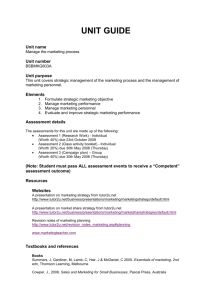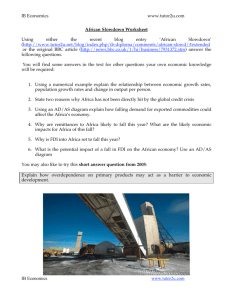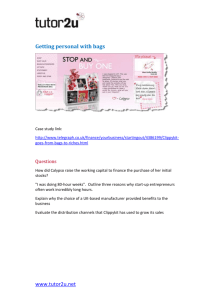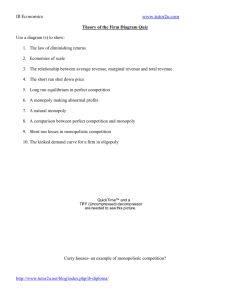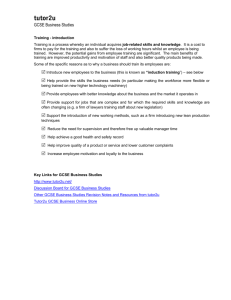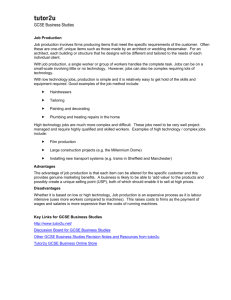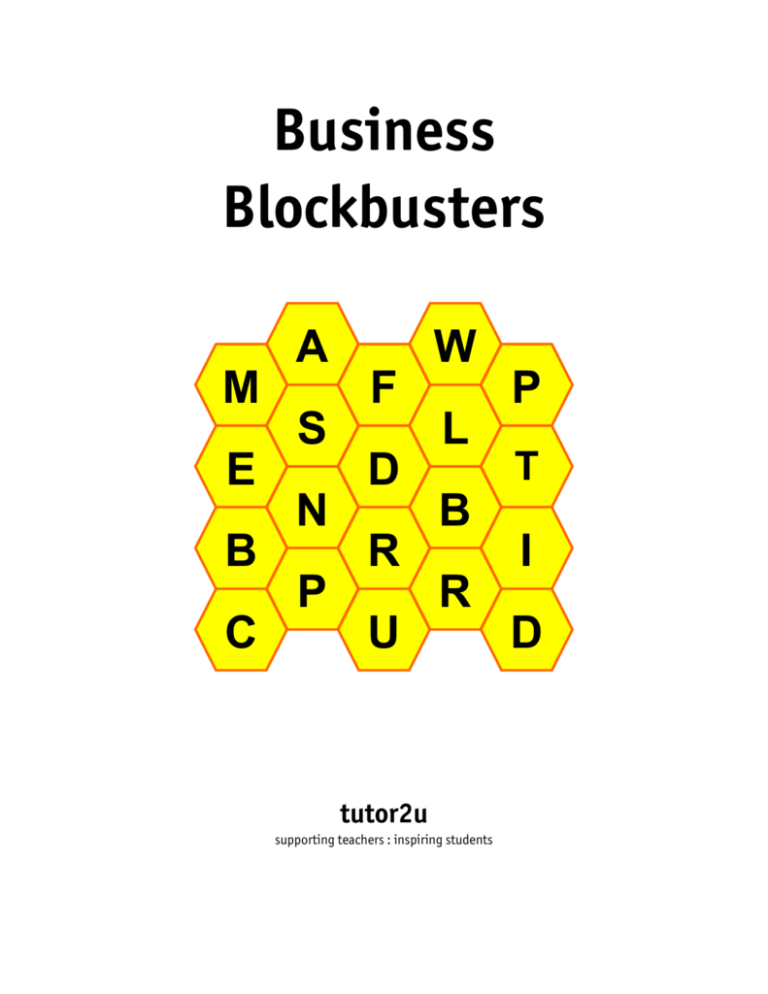
Business
Blockbusters
M
E
B
C
A
S
N
P
F
D
R
U
W
L
B
R
tutor2u
supporting teachers : inspiring students
P
T
I
D
Business Blockbusters – Question Sheet
HOW TO PLAY
In the classic (TV) game of Blockbusters, a solo player competed against a "team" consisting of two
related contestants thus setting out to prove if two heads really were better than one.
You could split students into single v pair teams; or perhaps only allow one/two students from
teams to answer any particular question.
Our game board replicates the classic Blockbusters game in the UK. It consists of 20 interlocking
hexagons, arranged in five columns of four. Each hexagon contains a letter or letters of the
alphabet. A contestant or team chooses one of the hexagons and is asked a question (from the list
provided) whose correct answer begins with the chosen letter.
By tradition, the question-master for the game is called "Bob". It is common practice for the
contestant to make their selection by saying something like "Can I have a 'P' please, Bob".
The game begins with a toss-up question to play for control of the board, starting with a letter
chosen by you (Bob) from the board. The teams or players can raise their hands in the middle of
reading of a question. If a player or team gets the correct answer, they gain control of that hexagon
(click on it to change to the right colour) and are given the chance to choose another one.
If the answer is incorrect, the opposing team or player is given a chance to answer it. If nobody
answers it correctly, you (Bob) must ask another question whose answer begins with that same
letter.
The object of the game for the solo player (or smaller team is to complete a vertical connection
from the top of the board to the bottom (which requires at least four correct answers).
The object for the pair (or larger team) is to make a horizontal connection from the left side of the
board to the right (which requires at least five correct answers).
The first player or team to win two games wins the match.
This game comes with a selection of questions that you can use for the letters provided. There
should be enough for a complete match (i.e. best of three games). If you run out of questions for
particular letters, we suggest you consult a suitable business studies textbook, or perhaps get the
students to create some new questions!
As host, you change the colours of the game board hexagons by clicking on them. Click once to
change the colour to blue (the team). Click the hexagon again to change the colour to white
(single player). Click once more to return the game board to its starting colour (yellow). Good
luck!
© Tutor2u Limited 2006 All Rights Reserved
www.tutor2u.net
Business Blockbusters – Question Sheet
Brand
Which A is a measure of liquidity calculated as current assets (less
stocks) divided by current liabilities.
Which A involves buying another business and is also known as a
“takeover”.
Which A do you see all around you and is defined as paid-for
communication, aimed at informing or persuading?
What A are the overall goals of a business or organisation – i.e. what
the business is trying to achieve?
What A is the process of assessing the effectiveness of the performance
of an employee, as measured against previously set targets?
What A are things that a company owns including cash, stocks, debtors
and fixed assets?
What A is a management style that involves telling employees what to
do?
What B occurs when a trade debtor proves unable to repay amounts
owed to a business?
What B shows the financial position (assets and liabilities) of a
business at a specific moment in time?
What B is a method of production where a production task is divided
into parts or operations and each operation is completed before the
next operation is performed?
What B involves analysis and comparison of how other businesses
operate more efficiently or effectively?
What B is paid to employees based on the achievement of certain
targets or objectives
What B is a recognisable name, logo or symbol that identifies a
product?
Breakeven
What B is the level of output where total revenue equals total costs?
Acid (test ratio)
Acquisition
Advertising
Aims
Appraisal
Assets
Autocratic
Bad debt
Balance (sheet)
Batch
Benchmarking
Bonus
Budget
Business (plan)
Capacity
Capital
Capital (intensive)
Cash
Centralisation
What B is prepared by management to estimate the revenues and costs
of a business over a specified future period?
What B is a written document that sets out the objectives of an
organisation and how it intends to achieve them?
What C is the maximum production output a business can achieve with
its existing resources?
What C is money that has been invested into the business – usually by
shareholders?
What C describes industries where businesses need to invest heavily in
fixed assets in order to operate effectively?
What C is shown as part of current assets in the balance sheet and is
usually kept at the bank?
What C describes a management structure where decision-making is
concentrated with senior managers at the heart of the organisation?
© Tutor2u Limited 2006 All Rights Reserved
www.tutor2u.net
Business Blockbusters – Question Sheet
Debtors
What C describes the line of authority in an organisation – i.e. who
reports to whom?
What C is the kind of bargaining that happens when a trade union
negotiates with employers on behalf of union members?
What C is a business with a separate legal identity that is owned by
shareholders?
What C is the final user of a product and is not necessarily the same
person who actually buys the product?
What C is calculated as revenue (or sales) less total variable costs and is
helpful in working out breakeven?
What C is an organisation where the members have an equal say in how
it is run?
What C are sales made by a business where the customer is allowed to
pay later?
What C describes all people, businesses or other organisations to which
a business owes money?
What C are assets are shown as a separate category in the balance sheet
and include things such as stocks, trade debtors and cash?
What D are people (customers or other businesses) who owe a business
money?
Delegation
What D happens when a manager entrusts a subordinate with a task?
Chain of command
Collective (bargaining)
Company
Consumer
Contribution
Cooperative
Credit
Creditors
Current
Democratic
Depreciation
Direct
Directors
Diseconomies (of scale)
Disposable (income)
Distribution channel
Diversification
Dividends
E-commerce
What D is a management style that involves listening to or consulting
with employees before making a decision?
What D is the fall in value of certain fixed assets, such as vehicles and
machinery, over time?
What D are costs that are directly linked to production output such as
hourly wages paid to factory staff and the costs of raw materials?
What D are managers appointed by shareholders who have overall
responsibility for running a company
What D’s happened when unit costs increase as a firm increases the size
of its operations?
What D is the amount of income that employees actually have to spend
after tax has been taken from pay?
What D is a channel that is how a business gets its products to the end
consumer?
What D is a strategy where a business expands by producing a new
product into a new market?
What D are payments made by a company to its shareholders out of
profits earned?
What E is the use of the Internet to trade with consumers and other
businesses?
© Tutor2u Limited 2006 All Rights Reserved
www.tutor2u.net
Business Blockbusters – Question Sheet
Economic (growth)
What E is the rate of increase in the value of goods and services
produced by an economy as a whole?
Efficiency
What E measures how well a business is using its resources?
Ethical
What E is the name given to someone who works for a business in
return for payment?
What E is used to describe a person who turns a good commercial idea
into a successful business?
What E is the policy of a business that describes how the business deals
with its stakeholders?
Euro
What E is the currency of many members of the European Union
Exchange (rate)
What E is the price of one currency in terms of another?
Exports
What E are goods and services that are sold to customers overseas?
Employee
Entrepreneur
Flotation
What E are costs or benefits to society associated with a business
activity?
What F describes Government policy on taxation and government
spending?
What F are assets that provide a benefit for a business in the long-term
(normally more than one year) and include examples such as plant and
machinery and computer systems?
What F is where a business organizes work in order to suit the job in
hand and the needs of employees using ideas such as part-time and
zero-hour contracts?
What F happens when the shares of a company are offered for sale on a
stock market for the first time?
Flow
What F is a continuous production process?
Externalities
Fiscal (policy)
Fixed (assets)
Flexible (working)
Gross (profit)
What F is an attempt to predict the future (e.g. sales, profits, cash
flows)?
What F is a kind of business organisation where one business acquires
the right to use the name and products of another business – and is
often used in the service sector?
What F are benefits such as health insurance and company cars made
available to employees in addition to their pay?
What G describes the growth of multinational businesses that have
operations around the world?
What G is a measure of profit earned from the trading activities of a
business and is calculated as revenue less cost of sales?
Hierarchy
What H describes the levels of management in an organisation
Forecast
Franchise
Fringe (benefits)
Globalisation
© Tutor2u Limited 2006 All Rights Reserved
www.tutor2u.net
Business Blockbusters – Question Sheet
Horizontal
(integration)
Imports
Induction
Industrial (action)
Inflation
Interest (rate)
What H happens when businesses at the same stage of the production
process are joined together?
What I are goods and services that are bought from businesses located
overseas?
What I is training aimed at introducing new employees to a business
and its procedures?
What I is action taken by employees, unusually supported by a trade
union, as part of a negotiation with employers?
What I is the rate of increase in the general price level of all goods and
services?
What I is the cost of borrowing money or the income received on money
saved?
Internal
(communication)
What I is communication between people in the same organisation?
Job (production)
What J is a production method where the complete production task is
handled by a single worker or group of workers?
Just-in-time production
(JIT)
What J is a method of lean production where inputs into the production
process arrive just as they are needed?
Liquidity
What K is a Japanese word that describes an approach to organising
work where employees are always looking for ways to improve their
tasks?
What L describes techniques that involve reducing waste in the
production process?
What L is defined as everything a business owes to other businesses or
individuals and has a monetary value?
What L is a theory which predicts the stages a product goes through
from introduction to withdrawal from a market?
What L is an advantage of setting up a company, where the owners of
the business are liable for the debts of a business up to the amount
they have invested?
What L is measured by various ratios that assess the ability of a
business to meet its short-term liabilities?
Loss
What L happens when the costs of a business exceeds its revenues?
Kaizen
Lean (production)
Liabilities
Life cycle (product)
Limited liability
Loss leader
Manager
Market
What L is often used by retailers who sell a product for less than its cost
in order to attract customers?
What M is an employee responsible for controlling the resources of an
organisation?
What M describes any place (real or virtual) where buyers and sellers
meet to exchange goods and services?
© Tutor2u Limited 2006 All Rights Reserved
www.tutor2u.net
Business Blockbusters – Question Sheet
Merger
What M is the proportion of an industry or segment that is owned by a
specific business, product or brand?
What M is a business discipline that involves identifying customer
needs and wants, and providing products that meet those needs and
wants?
What M describes a market where the product concerned appeals to a
large number of customers (e.g. packaged beach holidays to Spain)?
What M is a more experienced member of staff who advises and support
a new or inexperienced employee?
What M happens when two businesses of equal size are joined
together?
Mission (statement)
What M is the statement of the general purpose and aims of a business?
Market (share)
Marketing
Mass (market)
Mentor
Niche (market)
What M is the combination of the four main elements of marketing:
product; price; promotion and place?
What M is the use by government of changes in the money supply and
interest rates to influence the economy?
What M describes the situation where just one firm dominates a
market?
What M is a business such as Sony and McDonalds that has operations
in several countries?
What N concerns the transfer of ownership of an organization from the
private sector to the public sector?
What N is the difference between the total value of assets owned by a
business and the total of its liabilities?
What N is a market where the product concerned appeals to a limited
number of customers?
Objectives
What O are the specific targets that a business wants to achieve?
Mix (Marketing)
Monetary (policy)
Monopoly
Multinational
Nationalisation
Net assets
Oligopoly
What O is training that takes place away from the workplace (e.g. a
course)?
What O describes the situation where just a few firms dominate a
market?
On-the-job training
What O is job-specific training undertaken whilst working?
Off-the-job training
Ordinary (shares)
Organic (growth)
Organisation (chart)
Output
What O are the main kind of shares in a company, with voting rights on
the key company decisions?
What O is growth achieved by a business which arises from re-investing
in the business rather than making acquisitions (e.g. launching a new
product)?
What O is a chart or illustration that shows the internal structure of a
business?
What O is the total quantity produced by a business, employee or
machine over a given period of time?
© Tutor2u Limited 2006 All Rights Reserved
www.tutor2u.net
Business Blockbusters – Question Sheet
Primary (sector)
What O involves contracting out certain parts of a company’s
operations to specialist providers (often overseas)?
What O are the costs that are incurred by the general operation of a
business, but are not directly related to the production of any specific
product?
What O is time that employees work beyond their normal working
hours?
What O is a kind of brand used extensively by retailers and includes
examples such as Tesco Finest and Asda George?
What P is a business of unlimited liability owned by two or more people
who share responsibilities and profits?
What P is used in investment appraisal and is a measure of how long it
takes for an investment project to repay the initial investment?
What P is a pricing strategy of charging a much lower price whilst a
product is trying to gain share of a market from competitors?
What P is a retirement plan intended to provide a person with a secure
income for life
What P is the part of the marketing mix that focuses on where a firm’s
products are sold?
What P describes an economy where key economic decisions (what is
produced; how it is produced) are taken by government?
What P is an announcement about a business or its products that is
intended to create publicity?
What P is the part of the marketing mix that determines how much
money will be charged to customers when they buy goods and services?
What P is the sector of the economy that involves activities in the first
stage of the production process (e.g. mining)?
Primary (market
research)
What P is market research that involves getting original data directly
about products and markets - data that did not exist before?
Outsourcing
Overheads
Overtime
Own-label
Partnership
Payback (period)
Penetration (pricing)
Pension
Place
Planned (economy)
Press (release)
Price
Productivity
What P involves the transfer of ownership of an organization from the
public sector to the private sector?
What P describes any process which involves taking inputs and
transforming them into outputs?
What P is a measure of output per unit of input (labour, equipment, and
capital)?
Profit
What P arises when the revenue of a business exceeds its costs?
Privatisation
Production
Promotion
Protectionism
What P is the part of the marketing mix that covers the methods by
which a business makes its products known to customers – both
existing and potential?
What P describes attempts by countries to guard their own industries
through restrictions on trade (e.g. import quotas and tariffs)?
© Tutor2u Limited 2006 All Rights Reserved
www.tutor2u.net
Business Blockbusters – Question Sheet
Qualitative (research)
What P describes organisations that are owned or controlled by the
government?
What P is spending by government on areas such as defence, education
and health?
What P is the promotion of a business through news stories,
sponsorship and similar activities?
What Q is market research that attempts to find out the reasons why
people behave in a certain way?
Quality
What Q describes where a product meets a customer’s requirements?
Public (sector)
Public (expenditure)
Public relations (PR)
Ratio (analysis)
What Q is market research that involves asking pre-set, factual
questions to a sample of people in order to obtain statistically valid
data?
What Q, used in market research, involves a list of questions aimed at
gathering information from respondents?
What R refers to a group of calculations of financial performance that
illustrate how well a business is doing?
Recruitment
What R is the process of attracting applicants to a job vacancy?
Quantitative (research)
Questionnaire
Sampling / Sample
What R happens when employees are dismissed because their jobs are
no longer needed by the organisation they work for?
What R is another term for the overall package of financial rewards paid
to an employee?
What R is a business that buys products from manufacturers and
wholesalers and sells onto end consumers?
What R are the profits earned by a business that are reinvested in the
business rather than paid out to the business owners?
What R – another name for the value of sales made by a business – is
calculated as price times quantity sold?
What S is a regular (usually monthly) payment to an employee that is
not directly related to the number of hours worked?
What S is widely used in market research and involves looking at a small
group to draw conclusions about the population as a whole?
Secondary (market
research)
What S is market research that involves obtaining information from
existing sources and material?
Segmentation
What S is the process of dividing up customers into groups based on
their different needs and wants?
Selection
What S is the process of deciding which applicant for a job to accept?
Self-employed
What S is a person who works for himself or herself rather than for
another employer?
Redundancy
Remuneration
Retailer
Retained (profits)
Revenue
Salary
© Tutor2u Limited 2006 All Rights Reserved
www.tutor2u.net
Business Blockbusters – Question Sheet
Services
What S describes business activities that are mainly delivered in the
tertiary sector?
Shareholders
What S are the owners of a company?
Skimming (price)
What S is a pricing strategy of charging a higher price for a new product
to take advantage of customers who are happy to pay for innovation?
Sole (trader)
What S is a business owned and managed by one person?
Stakeholder
What S describes the number of employees who are directly supervised
by a manager?
What S happens when an employee or business concentrates on
activities in which they have the most appropriate skills?
What is a method of promotion where a business provides financial or
other support of an event, organisation (e.g. charity), team or
individual?
What S is an individual or group that is directly or indirectly affected by
the actions of a business?
Start-up costs
What S are costs that occur as a new business is created and launched?
Span (of control)
Specialisation
Sponsorship
Sub-(contract)
What S are raw materials and work-in-progress involved in the
production process + finished goods held for resale?
What S describes the way in which a business sets out to achieve its
aims and objectives?
What S is an arrangement where some parts of a contract are performed
by another person or business?
Subsidiary
What S is a company that is owned by another company?
Suppliers
What S is the term given to businesses that provide raw materials,
components, finished goods and services in exchange for payment?
Takeover
What T is the purchase of one business by another?
Tariff
What T is a tax levied on the import of goods and services?
Tertiary (sector)
What T is the sector of the economy comprising businesses involved in
the provision of services (e.g. banking, holidays)?
Total Quality
Management
What T is an attitude to work where the aims are zero defects and total
customer satisfaction?
Trade (union)
What T is an association that aims to protect the rights of employees?
Training
What T describes the whole range of methods used to educate
employees, develop skills, understanding and attitudes?
Stocks
Strategy
© Tutor2u Limited 2006 All Rights Reserved
www.tutor2u.net
Business Blockbusters – Question Sheet
Turnover
Unemployment
Unique (selling point)
Unlimited (liability)
Variable costs
Variance
Venture (capitalist)
Vertical (integration)
Warehouse
Warranty
Wholesaler
Working (capital)
What T is another name for sales or revenue?
What U measures the number of adults who are economically active and
not in work?
What U is a distinctive feature of a product that can be used to attract
customers?
What U describes the liability of sole traders and partners for the debts
of their business?
What V are costs that change directly as the output of a business
changes?
What V is used in budgeting and is the difference between the budget
and what is actually achieved?
What V is a professional investor that invests in a business in return for
a stake in the business?
What V is the joining of firms at different stages of the same production
process?
What W is a place for the reception and storage of goods and is almost
always found in a factory?
What W is a guarantee to replace or repair a faulty product, free of
charge, if it goes wrong within a specified period of time?
What W “break bulk” by buying in large quantities and selling on
smaller quantities to retailers?
What W is calculated as the difference between current assets and
current liabilities?
© Tutor2u Limited 2006 All Rights Reserved
www.tutor2u.net

